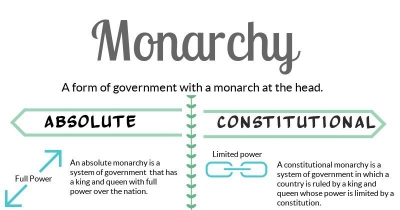
There are 26 monarchies in the world where kings, queens, sultans, emperors and emirs rule over 43 countries in all. The most common forms of monarchy are absolute and constitutional.
Absolute monarchy:
Absolute monarchy is a form of government in which the monarch holds supreme authority, unfettered by constitution or legislature. Countries where monarchs maintain absolute power are Brunei, Eswatini, Oman, Saudi Arabia, Vatican City and the individual emirates composing the United Arab Emirates. The Vatican City has an absolute elective monarchy, in which the head of the Roman Catholic Church holds power.
Constitutional monarchy:
Constitutional monarchy is a system of government in which a monarch shares power with a constitutionally organised government. In this form of government, the monarch is the head of state, having largely ceremonial roles. It is the Prime Minister who actually governs the country.
Constitutional monarchy exists in countries such as the United Kingdom and the Commonwealth Realm, Greenland, the Netherlands, Belgium, Norway, Denmark, Spain, Luxembourg, Lesotho, Monaco, Liechtenstein, Sweden, Japan, Cambodia, Thailand, Tonga, and Bhutan.
Picture Credit : Google
